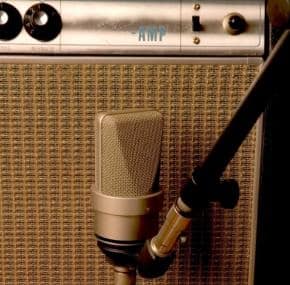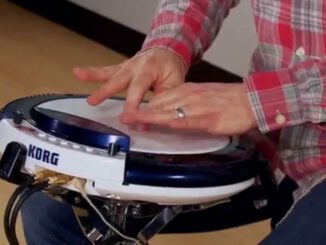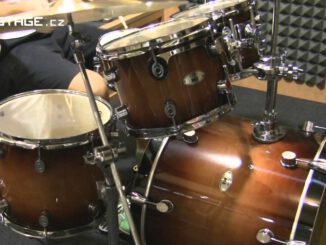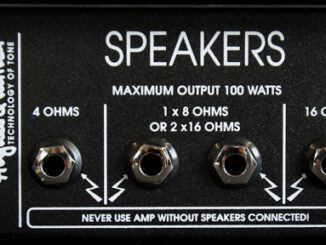 Just as tube guitar amps provide warmer sound and more natural tone than solid state amps, tube microphones accomplish the same thing fir vocals and miked instruments. Classic mics like the Neumann U67 have been a favorite of studio engineers for decades, but today there are several more affordable tube mics on the market that get the job done quite well.
Just as tube guitar amps provide warmer sound and more natural tone than solid state amps, tube microphones accomplish the same thing fir vocals and miked instruments. Classic mics like the Neumann U67 have been a favorite of studio engineers for decades, but today there are several more affordable tube mics on the market that get the job done quite well.
We tested tube microphones made by Audio-Technica, AKG and Alesis by tracking vocals, a Martin D-1 acoustic guitar and a Les Paul through a Peavey Classic 30 combo amp to an Alesis ADAT and direct to a Panasonic 3700 DAT machine. All three microphones were quite impressive, though some seemed better-suited for certain applications than others.
First, a bit of background information. All the mics tested are condensers, which generally offer superior high-frequency response and better sound than dynamic mics. They’re also expensive, sensitive and less durable, so they tend to stay in the studio. In addition, condensers require a power source, and while many of them run on 48-volt phantom power supplied by a mixer through a regular mic cable, tube microphones require their own power supply. Each of the mics we tested comes with an external power supply, a cable to connect the mic to the supply and a noise reducing shock mount.
Audio-Technica AT4060
The Audo-Technica AT4060 ($1249.99) features a unidirectional cardioid pattern that allows it to accept sound from the front and reject it from the back and sides. The mic was great for vocals, providing a full midrange that was neither thin nor muddy and which cut right through the mix. It also performed quite well on acoustic guitar, capturing the instrument’s full, low-end body as well as its higher frequencies, and it was superb for clean electric guitar sounds and solos, picking up the brighter frequencies and delivering a clear, ringing tone.
The AT4060 comes with a small case for the microphone but nothing to hold the power supply and cables required for it—perhaps the company’s way of encouraging you to leave the mic in the studio. Overall, this is a wonderfully versatile mic with excellent low-midrange characteristics.
AKG Solidtube
The AKG Soldtube ($1099) is a large cylinder mic that, like the AT4060, has a cardioid pattern. In addition, the Soldtube has a -20 dB pad to reduce its output and a bass rolloff switch on the power supply. The mic, power supply and accessories come n a handy metal carry case.
The AKG produced a slightly brighter sound than the Audo-Technica, and as a result, vocals had a bit more presence to them, with a high-mid boost that was wonderful. The acoustic guitar sounded bright and punchy, but the AKG didn’t reproduce as much of the guitar’s low end, resulting in a slightly thinner tone. The AKG really excelled on electric guitar, where clean tones rang full and bright and crunchy rhythm tracks were in-your-face huge. This is a reliable mic for “featured track” applications, like lead guitar and vocals.
GT Electronics AM62
Is it any wonder that Alesis, who brought us affordable ADAT recording and inexpensive signal processors, have developed and affordable tube mic that sounds great and is loaded with features?
Manufactured by the company’s GT Electronics Division, the AM62 features a -10dB pad, bass rolloff switch and Groove Tube GT5840M tube. In addition to its cardioid pattern, the microphone can operate in a tighter super-cardioid pattern as well as figure-eight and omnidirectional patterns. The AM62 also comes with a hard mount (although neither the hard mount or shock mount were as steady as the others we tested) and a strong metal carry case.
The AM62’s solid midrange sounded terrific on vocals. While it made the acoustic sound rather boxy, with perhaps too much midrange, the AM62 did a nice job of capturing the instrument’s full tone. The mic worked especially well with the electric guitar, delivering smooth clean tones and a bright distorted tone that helped lead lines cut through the mix. With a variety of features, quality sound and an informative manual (complete with tips on miking different instruments), the AM62 is a workhorse around which you can base your studio.
The End Line
As a multipurpose microphone for vocals, acoustic and clean electric guitar, the Audio-Technica AT4060 delivers the goods. While not as sensitive at revealing the tonal nuances of the acoustic guitar, the AKG Solidtube did a superb job with vocals and with both clean and distorted guitar tone. And for all-around performance and features, you can’t go wrong with the budget friendly GT Electronics AM62. Lean more about Recording Gear





Sound ideal for recording the notoriously ‘difficult to capture’ electric guitar … must try one out. Expensive enough alright but well worth the investment I’d imagine. The good ol’ SM58 will have to do for now :). guitanorak
Indeed Guitanorak, the SM57 is an amazing mic in itself. Great for live or recording use. These aforementioned mics cost as much as a nice guitar amp.
yeh the SM is grand for recording the amp, but I need to it turn up to drive it (its a tube), to get the best sound, and it can get pretty loud. Y’know yourself … neighbours etc.
So these days I’m using a Vox Tonelab D.I., It has a built in Tube/Valve for the overdrive/distortion. Solved my problem well, best of both worlds – Tube but silent. But I still fancy one of those Mics you listed :). guitanorak